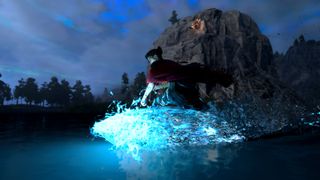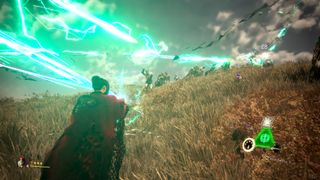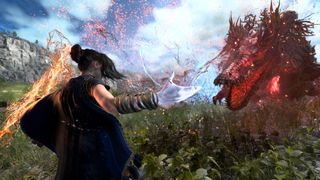The combat in Forspoken feels like the zenith of what Zelda fans could achieve in Breath of the Wild. While some of us were running around Hyrule cowering in fear from Lynels and Guardians, other players were working out how to use every tool at Link's disposal, all at the same time. The result was incomprehensibly complex combos, or clips of players cycling through menus at impossible speed to chain together devastating takedowns. In Forspoken, that approach won't be the domain of a dedicated few – it's how you're intended to tackle every single fight.
Protagonist Frey's magical abilities are split in a number of different ways to make it easier to navigate between different spells in the heat of battle. At the start of the game, your skills are based around manipulation of the natural world; a shield wrought from earth, a magical barrage of rocks, huge vines to club or ensnare enemies, for example. With that early collection, you'll switch between spells intended for more traditional attacks, and those that have more powerful or lingering effects; spamming the latter while weaving the former in between each cast. Different spells (and different types of spells) are found on easily-navigable radial menus, and while efficiently swapping abilities in the midst of combat is a little tricky to begin with, it's easy to get the hang of.
Those early spells alone require an impressive knowledge of Frey's initial abilities, but as the game progresses, you'll be able to switch to an entirely different school of magic. Later on, a pyromantic approach swaps your earthy basic attacks for flaming swords and spears, and your spells change to include pillars of flame or fiery elementals. Another radial menu determines which array of skills you're using in a given moment, making it easy to swap from one discipline to another.
Freyrunning


As the audience's skills improve, I can see a very flashy system emerging; a few preparatory, defensive efforts to lay the groundwork, before you start carving and blasting your way through foes with an endlessly-rotating barrage of spells. Some abilities in particular work beautifully together – grasping vines to hold an enemy in place while a wall of flame closes in around them, or a blast from your shield to stagger a foe before you charge in for a swipe with a fiery sword.
Combat becomes even more skilful as you weave in Frey's magical parkour. Abilities are enhanced if you're on the move, granting extra power to body checks or extra range to certain attacks. Frey is dazzlingly fast, and the extra layer of control required to effectively weave in certain abilities in a pinch makes for fights that are surprisingly intricate given the explosive and varied nature of many of the available combat tools.
Unfortunately, that makes parkour pretty disappointing when you're not in a fight. Forspoken's open world is large and offers plenty of verticality, but there's very little skill involved when it comes to traversing that enormous space. Closer to a sprint button than anything else, "magical parkour" looks cool, but didn't offer any of the skill-based traversal I was hoping for. Even later on, it looks as though climbing the steepest cliffs will simply be a test of stamina, coupled with a series of fumblingly persistent jumps more akin to Skyrim than Dying Light or Mirror's Edge.

"So far, the strict focus on combat means it's very hard to get a sense of how the world of Athia will feel once Frey's story actually begins."
The speed that magical parkour offers does at least help tackle the lack of content in those open maps. There's a reasonable amount to uncover, but even in the hour or so that I played, I found myself sprinting past basic combat encounters in search of something new. Perhaps that's a symptom of my deliberately story-light demo, but its pseudo-apocalyptic setting and simplistic traversal means there's nowhere to set your sights on, and seemingly little reason to explore beyond your objective.
Helping cut through the relative emptiness is Frey's back-and-forth with Cuff, a sentient bangle through which she draws her powers. The pair mostly chatter immediately before and after combat, meaning you won't be subject to the cringeworthy stream of consciousness implied by that recent trailer. In fact, while Cuff's 'charmingly sarcastic mentor with a British accent' bit is a little played-out, some of the genuine concern portrayed in his dialogue with Frey is actually quite touching.
So far, the strict focus on combat means it's very hard to get a sense of how the world of Athia will feel once Frey's story actually begins. But while Forspoken falls a little flat in its quieter moments right now, a greater sense of narrative purpose is only likely to build on some excellent combat. Speedy, intricate, and endlessly satisfying when it begins to come together, it's an excellent realisation of the varied spellcasting that drew me to Forspoken in the first place. I just hope that the rest of the game can live up to the impressive baseline that these fights have set.
If sprawling action-storytellers are your bag, you should check out the best RPG games available right now.


